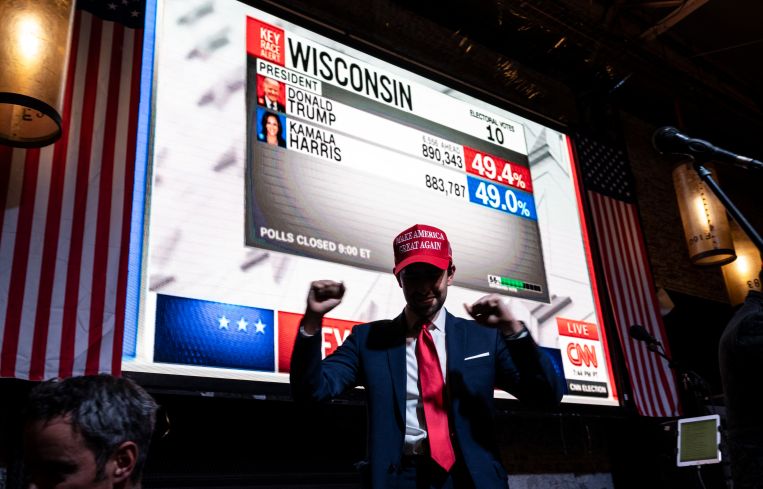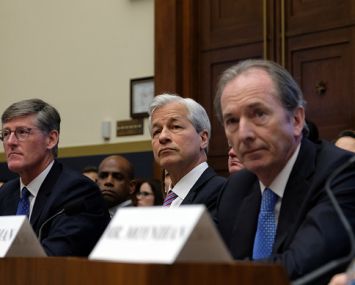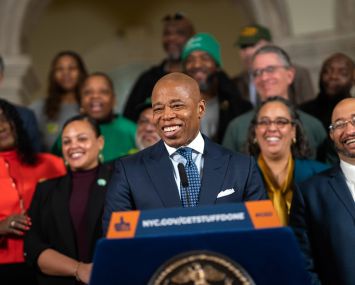What Could Trump 2.0 Mean for Commercial Real Estate?
Sure, the GOP president-elect and real estate tycoon is considered pro-business almost by default — but no one’s yet certain which policies will drop, and their effects remain foggy

Photo: AFP via Getty Images
With a trifecta victory in the November races for the presidency, the Senate and the House of Representatives, Republicans led by President-elect Donald Trump are expected to push through substantial legislation that could significantly alter the U.S. commercial real estate environment.
Yet, despite a general sense within the industry that the incoming Trump administration has a more pro-business attitude compared to its Democratic rivals, there is still a lack of clarity on which policies touted by Trump on the campaign trail will actually be implemented. There is also uncertainty more than a month after the election as to when those policies may take effect and, crucially, their ultimate influence on the real estate market and the all-important cost of borrowing money to finance and refinance projects.
SEE ALSO: CRE Owners Prefer an Indicted Mayor Eric Adams Over the Alternatives
Take, for instance, a controversial economic tactic embraced by Trump throughout this election cycle: tariffs, or taxes on imported goods. Trump has called for a dramatic escalation of tariffs, in excess of the already steep ones his first administration levied against China, as means of both reducing proliferation of foreign-made products and re-incentivizing domestic manufacturing. At points during the most recent campaign, Trump proposed a 60 to 100 percent tariff on Chinese products, and up to 20 percent of universal tariffs on imported goods from all countries.
“We’ll lead an American manufacturing boom,” Trump said at a campaign speech in September. “When they have to pay tariffs to come in, but they have incentive to build here, they’re going to come roaring back.”
Although embraced by some manufacturers as a method of leveling the playing field against cheaper foreign products, or for their use as a geopolitical negotiating tool, economists and some industry insiders have warned that tariffs of such severity could ultimately have the opposite effect on real estate development and investment trends. In addition to likely driving up the cost of building materials, which would make construction more expensive, higher inflation could also rear its head as many companies pass on the higher costs associated with tariffs to consumers — including apartment and office tenants as well as homebuyers.
A resurgence of inflation would halt the Federal Reserve’s newfound confidence, and pause its change in policy toward lowering interest rates. It could even force the Fed to reverse course, putting renewed pressure on the financing environment.
“[Tariffs] have the potential to really frustrate this idea that we’re trying to lower inflation, and therefore be able to lower interest rates,” Leland Collins, senior director of real estate tax advisory for FTI Consulting, told Commercial Observer. “So I’m very concerned to see how that plays out, because if we can’t drop interest rates at the rate we’re expecting, that negatively impacts real estate since we’re such a leverage-heavy industry. So there’s a balancing act here that concerns me … but we’ll have to wait and see what happens there.”
Therein lies the rub. With roughly six weeks until Trump regains office, there remains much daylight between what Trump has proposed versus what policies will actually be pursued, let alone how aggressively.
Still, whatever one may think of Trump’s more vague or controversial ideas, there is at least one realm of policy that, while still uncertain, will essentially be forced into focus in the near term: taxes.
The Republican-dominated Congress is expected to prioritize yet another dramatic change to the U.S. tax code, reminiscent of 2017’s Tax Cuts and Jobs Act (TCJA), a once-in-a-generation overhaul affecting everything from raising the child tax credit and estate tax exemption to permanently lowering the overall corporate tax rate from 35 percent to 21 percent.
Certain provisions created by the TCJA are set to expire next year, however, which will drive Congress to act in order to save or abandon the first Trump administration’s signature policy.
The elevated child tax credit and estate tax exemption are among the provisions expiring, as are higher standard reductions, state and local tax (SALT) deductions, and gift taxes. However, more pertinent to the real estate industry is the qualified business income (QBI) deduction, which allowed flow-through entities like limited liability companies, general partnerships and sole proprietorships to claim up to a 20 percent deduction. Unless extended, the QBI deduction will fizzle out entirely by the end of next year.
“Some of these provisions that came with the TCJA, that was really coming from the Trump administration only,” said Ashalata Shettigar, managing director of the business tax division for FTI Consulting. If Kamala Harris had won the presidency, Shettigar said, “they probably would’ve just let these [provisions] sunset and not restore them back. President Trump himself is a great lobbyist for the real estate industry … but we wouldn’t see this coming through if it was Harris coming into power.”
Trump and his allies have proposed a number of other changes to the tax code, such as a further reduction of the corporate tax rate to 20 percent, or 15 percent for companies that manufacture their products within the U.S.
There has also been discussion of reinstating the ability of companies to fully deduct the cost of qualified assets, a provision known as bonus depreciation. Via bonus depreciation, the TCJA allowed businesses to deduct 100 percent of the cost of assets acquired and placed into service between the end of 2017 and the beginning of 2023, though the provision has slowly begun to phase out. Unless reinstated, the deduction will be eliminated by 2027.
“The general consensus on [Capitol Hill] is that 2025 will be all about tax reform,” Collins added. “It’s going to consume a significant amount of time and focus of people in D.C., and it certainly will be top of mind for our clients that work in the asset management, real estate and private equity space.”
There are other tax policies floating in the ether that Trump has expressed support for in the past, though for which the current level of interest is unclear. That includes an expansion of the TCJA’s Opportunity Zone program, which provides tax advantages as incentives for investing in communities that the government deems low-income or blighted, as well as a potential reduction in capital gains taxes. For what it’s worth, the Heritage Foundation’s Project 2025 blueprint calls for a reduction of the capital gains tax rate from its current cap of 20 percent to 15 percent, which would be its lowest level since the early 1940s.
Yet, a key question facing the Trump administration and congressional Republicans is how to pay for the various tax overhauls, let alone other prominent aspects of Trump’s agenda. The nonpartisan Committee for a Responsible Federal Budget in late October projected that Trump’s policies could increase the federal deficit by $7.75 trillion, including over $5.3 trillion from the extension and modification of the TCJA alone.
Such a large deficit increase would likely trigger the Treasury Department to issue more securities, such as bonds, to account for that spending, thereby putting further upward pressure on interest rates and exacerbating the negative downstream effects that an interest rate boost would have on real estate financing.
While a policy enactment timeline was as of CO’s print deadline less clear than his tax agenda, Trump has also floated a number of policies aimed at alleviating the country’s housing crisis.
The cost of housing in the U.S. has risen dramatically since the start of the COVID-19 pandemic in early 2020 — by more than 50 percent, according to the Federal Reserve Bank of St. Louis. Average housing costs are also a major factor driving the general inflation rate, as housing accounts for about 45 percent of the core consumer price index, according to a report from the White House in September.
To address the affordability crisis, Trump and his allies have proposed a multipronged approach. One aspect is an effort, vague as of late November, to “cut unnecessary regulations that raise housing costs,” as stated by the 2024 Republican Party platform, which could include cuts to federal energy efficiency standards and possibly financial incentives for state and local governments to speed up their project approval processes. It’s those entities that largely control housing regulations like zoning.
Trump has also called for the opening of federal lands for development, an idea shared by both the Biden administration and Vice President Harris. Though how much land, and how much development could occur on that land due to its generally remote nature, remains to be seen.
“I think that the contribution of federal land and unused buildings is a long overdue idea that could address the fundamental undersupply of housing for Americans,” Tawan Davis, founding partner and CEO at The Steinbridge Group, said in Commercial Observer’s annual survey for its Owners Magazine. “This was a plank in both campaigns.”
If further embraced by Trump, cryptocurrency could also become a game-changer in the real estate investment space. Although once derided by the incoming president as a “disaster waiting to happen,” Trump has pivoted 180 degrees on digital currency in the years since, even saying at a Bitcoin conference in June that he wanted to make the U.S. the “crypto capital of the planet.”
Crypto companies, and their investors like Elon Musk, returned the favor with support for Trump throughout the election cycle. Although no exact policies have yet been proposed, a Trump presidency could ultimately encourage greater acceptance of crypto for use as payments in real estate and other transactions. The new administration could also throw its weight behind a government-backed digital currency, something the outgoing administration explored.
“It won’t happen in one day … but in general I think real estate is due to tokenize it,” said Ilan Bracha, founder of investment firm IB Global and brokerage advisory group The Bracha Team. “Everyone needs to [have confidence in it] in order to do it, but the ledger and blockchain are perfect for real estate. And when you have leadership that [supports] it from the top down, you will see that in the market as well.”
The incoming administration’s most striking and most controversial proposal to lower housing costs, however, is the potential mass deportation of undocumented immigrants. Trump has blamed housing inflation on illegal immigration, a claim echoed by his Vice President-elect JD Vance and others, and has vowed to expel millions of undocumented people in order to reduce housing demand, among other reasons.
Yet, whatever gains made in terms of lower demand could be offset by the fact that a significant portion of the worker pool in the construction trades is undocumented — up to 23 percent, according to a 2021 report by the Center for American Progress, a think tank — and that such a large reduction in that labor force would slow the pace of housing construction and consequently inflate prices.
Since housing costs are such a large contributor to inflation, mass deportations on the scale that Trump has proposed could have the ripple effect of placing upward pressure on interest rates if elevated inflation were to return — which, again, has stark implications for the real estate lending environment.
A telling sign of the market’s feelings toward the near-term interest rate environment is financial services firm CME Group’s FedWatch tool, which calculates the probability of Federal Reserve rate changes. On Oct. 18, FedWatch projected a more than 40 percent chance that the Fed would cut rates to between 3.5 and 3.75 percent by June of 2025. As of Nov. 18, that probability was kicked down to just 11 percent.
Indeed, a survey conducted by the Wall Street Journal before the election found that a majority of economists believed that inflation and interest rates would be higher under Trump than under Harris due to the former president’s policy proposals.
Still, some industry insiders are not only bullish on interest rate trends, but also on Trump’s overall convictions toward the real estate industry, given his personal history and endeavors.
“[Trump] owns a lot of real estate, so I don’t see him doing anything that would negatively impact the real estate market. He may be neutral, but he won’t be negative, and he may be positive,” Barry DiRaimondo, CEO of real estate company Steelwave, told CO. “I think lower interest rates are going to float all boats. And I think you’re going to see lower interest rates. A change of administrations is only positive from an economic perspective.”
Bracha agrees, adding that even if some of Trump’s policies do have inflationary repercussions, the former president’s real estate background, branding and presence back in the White House could instill confidence in both domestic and international investors that the U.S. markets are stable and the best place to invest.
“Trump, as president, actually has skin in the game, and he understands it better than many, many people,” Bracha said. “So what we can say is that when there will be a situation to impact [real estate], you know you have a good driver there, at least.”
Nick Trombola can be reached at ntrombola@commercialobserver.com.




